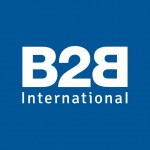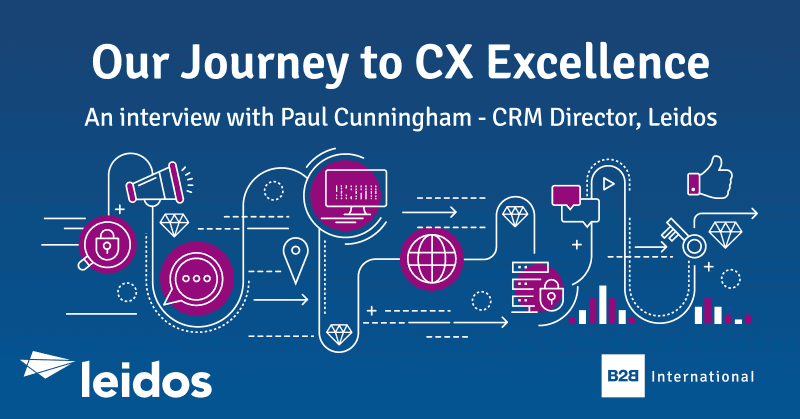
Find more examples, case studies and stories in our latest book
Having conducted hundreds of customer satisfaction and loyalty surveys over the last 20 years, we know first-hand what it takes to deliver CX excellence in b2b markets. Unfortunately, exceptional customer experiences are not as common as they should be, and it is this that drove us to write ‘B2B Customer Experience – A Practical Guide To Delivering Exceptional CX’.
The book is out now and is available to buy here. To celebrate the launch of the book we will be sharing a selection of different interviews with CX professionals, each talking about their own journey towards CX excellence. The sixth of which, with Leidos’ Paul Cunningham, is below.
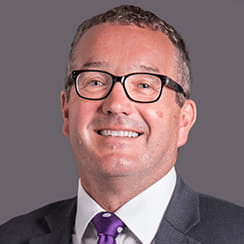
Paul Cunningham, CRM Director, Leidos
Can you give me some background to Leidos, the Ministry of Defence (MoD) and where customer experience fits in?
Leidos is a big American technology company and we won the contract with the Ministry of Defence when they went out to tender to manage their warehousing and logistics. As part of the contract the MoD wanted us to measure customer satisfaction and to set improvement targets after the first year to measure our success rate. In order to do this we needed an independent market research company and that is where B2B International fits in.
What are the difficulties in delivering excellent customer experience?
Out of the 2000 people who work on this contract, only just over 250 are Leidos. However, from the customer’s point of view our subcontractors and partners are all thought to be part of Team Leidos and so it is about making sure that everyone is joined up.
If people say “where’s that stuff I ordered?” it may take us a week to investigate and we might have to say we don’t know what went wrong and why it went wrong. However, we now have a very good customer feedback and complaints process in place whereby customers know now how to tell us how things have gone wrong. There is a good quality process in place for investigating these complaints and this never existed before.
The fact that we investigate and feedback has a huge beneficial effect on the customer. Our customers like the fact that we raise a customer correction report and something is properly investigated if deliveries don’t go to plan.
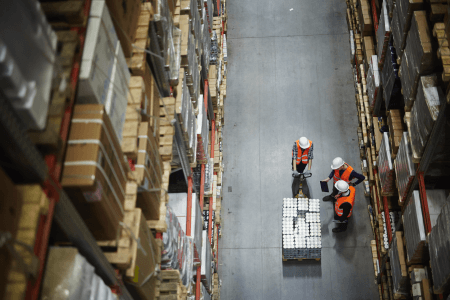
In logistics it is not always about speed. It’s about accuracy. Currently we are 95% on time in full. The customer knows that when our new systems are in place we will be able to do it even better and measure it better. People like to know that we are making improvements and they are excited by that.
How do you engage people within Leidos to be customer focused?
Communication is key. We have team briefings, newsletters and a lot of information on our intranet. People are working in teams to get the job done. Typically, people work in silos and it is our job to knit these together. I think the teams are genuinely customer focused but sometimes it is just a question of getting people into a conference room and getting them talking about customers and their needs. Probably half the people who work here have worked in the MOD, many of them military. This means that we know what our customer wants.
“I think the teams are genuinely customer focused but sometimes it is just a question of getting people into a conference room and getting them talking about customers and their needs.”
You have two types of customer; the MoD but also the thousands of end users in the Army, Navy and Air Force. How do you go about satisfying both in the services you supply?
Outside of the technology that we are upgrading we are also engaging with their global supply chain to procure a better deal for the MoD.
One example I can use is with waterproof socks. The army and marines have these as part of their kit because no matter what the conditions and even if their boots leak, it is important that their feet stay dry. The MoD’s requirement for waterproof socks was so specific that we could only buy one branded item and they were expensive.
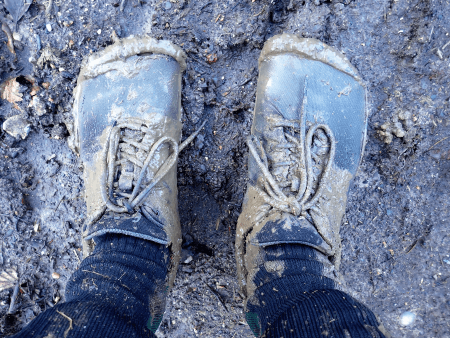
We challenged the MoD and we asked them simply to say what capability they wanted us to deliver against. If you are trying to achieve dry soldiers’ feet when they get wet you can find better products which are much cheaper. The savings we have made means the MoD is delighted. We are challenging the complete supply chain and opening the market up to a lot of new companies. Suppliers need to constantly work hard to keep that business through new ideas and innovation whilst delivering cost savings.
In terms of satisfying the users e.g. the frontline troops, the young men and women like to know they’re using a brand that they recognise. If the soldier or sailor knows that the product they are using is a well-known brand, they feel more comfortable in it. They want to know who makes it and they like to think that it’s a company that they have heard of and that it does a good job.
“In terms of satisfying the users e.g. the frontline troops, the young men and women like to know they’re using a brand that they recognise.”
Imagine a big field kitchen tent and the army chef has laid out his breakfast. The soldier who arrives for breakfast sees the Heinz ketchup and Nescafe tins and is reassured. It is important to the soldier who is turning up to a breakfast of bacon and eggs in some far flung land that they feel they are getting the best. When they’re away from home they want to feel that they’ve got Kellogg’s cornflakes and Nescafe coffee. If you give them coffee that they’ve never heard of, they’ll think that you are trying to rip them off. Of course we need to make sure everything is delivered on time and in full but if we can procure a better deal for branded products it will deliver value to the end user.
Where do you see the future challenges for Leidos to provide excellent customer service for the MoD?
“Future demands and expectations will always be higher because they don’t know what the starting point was and so we need to make sure that integrating our clever IT systems can improve the overall customer experience for years to come.”
The old systems and technology that we inherited means we’ve started from such a low point that we can only deliver a better service in the future. However, this cannot be changed overnight and therefore our challenge is going to be in three of four years’ time when we have sorted things out. People continually move within the MoD and we are now 3 years in to our contract and already most of our customer community were in different roles when we first started the contract. Future demands and expectations will always be higher because they don’t know what the starting point was and so we need to make sure that integrating our clever IT systems can improve the overall customer experience for years to come.
Readers of this article also viewed:
- Our Journey to CX Excellence: an Interview with… Gary Hitchens, Wolseley
- Our Journey to CX Excellence: an Interview with… Ian Webb, Antalis
- Our Journey to CX Excellence: an Interview with… Jo Ormrod, Coveris
- Our Journey to CX Excellence: an Interview with… David Ward, Yodel
- Our Journey to CX Excellence: an Interview with… Carol Sheppard, Molson Coors
- Go Beyond In Customer Experience – A Conversation With Chris Daffy
- Differentiating An Undifferentiated Product – A Conversation With Dale Grinstead

